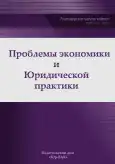Assessment of Regulatory Factors Forming Preferential Legal Regimes of Strategic Development of Tourist Regions
- Authors: Battalova L.M.1
-
Affiliations:
- Financial University under the Government of the Russian Federation
- Issue: Vol 19, No 1 (2023)
- Pages: 48-53
- Section: Public Law (State and Legal Sciences)
- URL: https://journal-vniispk.ru/2541-8025/article/view/250083
- ID: 250083
Cite item
Abstract
Purpose of the study. The article discusses the current state of legislative initiatives and the transformational processes accompanying them in the state-legal system aimed at the qualitative development of regional tourism. From a critical position, the most significant aspects of the legal field that have a predominant influence on the current state and prospects for the qualitative growth of tourist territorial clusters are analyzed. Conclusions. As a result of the study, the author comes to the conclusion that in the area under study, a stable federal-regional system of protectionism of individual industry and regional economic entities has been formed in recent years, which, in turn, has significantly increased their economic performance. At the same time, studies have shown that in the domestic regional economy there is a significant imbalance between the pace and quality of development of regional socio-economic systems. Based on the analysis, the author admits that the mechanism for supporting regional tourism contains imperfect elements in its design, due to the urgent need for operational support of the manufacturing sector of the economy in the context of forced import substitution. In particular, according to the author, a significant disadvantage of the system of state preferences is the sectoral nature of the bulk of preferential regimes. The foregoing allows us to state the expediency of further qualitative transformation of the instruments of the state-legal system for the development of the regional concept of tourism.
Full Text
##article.viewOnOriginalSite##About the authors
Linara M. Battalova
Financial University under the Government of the Russian Federation
Author for correspondence.
Email: linara_b@mail.ru
Cand. Sci. (Law), Associate Professor; Associate Professor of the Department of Legal Regulation
Russian Federation, MoscowReferences
- Federal Law No. 132-FZ of November 24, 1996 «On the Fundamentals of Tourist Activities in the Russian Federation». Approved by the State Duma of the Federal Assembly of the Russian Federation on October 4, 1996—Electronic resource. Access mode: http://www.consultant.ru/
- Federal Law No. 116-FZ of July 22, 2005 «On Special Economic Zones in the Russian Federation». Approved by the State Duma of the Federal Assembly of the Russian Federation on July 8, 2005—Electronic resource. Access mode: http://www.consultant.ru/
- Federal Law No. 244-FZ of December 29, 2006 «On State Regulation of Organizing and Conducting Gambling and on Amendments to Some Legislative Acts of the Russian Federation». Approved by the State Duma of the Federal Assembly of the Russian Federation on December 20, 2006—Electronic resource. Access mode: http://www.consultant.ru/
- Federal Law No. 224-FZ of 03.07.2015 «On public-private partnership, municipal-private partnership in the Russian Federation and amendments to certain legislative acts of the Russian Federation». Approved by the State Duma of the Federal Assembly of the Russian Federation on July 1, 2015—Electronic resource. Access mode: http://www.consultant.ru/
- Federal Law No. 115-FZ of July 21, 2005 «On Concession Agreements». Approved by the State Duma of the Federal Assembly of the Russian Federation on July 6, 2005. Approved by the State Duma on July 6, 2005—Electronic resource. Access mode: http://www.consultant.ru/
- Federal Law No. 377-FZ of November 29, 2014 «On the Development of the Republic of Crimea and the Federal City of Sevastopol and the Free Economic Zone on the Territories of the Republic of Crimea and the Federal City of Sevastopol». Approved by the State Duma of the Federal Assembly of the Russian Federation on November 21, 2014—Electronic resource. Access mode: http://www.consultant.ru/.
- Federal Law No. 488-FZ dated December 31, 2014 «On Industrial Policy in the Russian Federation». Approved by the State Duma of the Federal Assembly of the Russian Federation on December 16, 2014»—Electronic resource. Access mode: http://www.consultant.ru/
- Tax Code of the Russian Federation. Part II dated 05.08.2000 No. 117-FZ. Adopted by the State Duma of the Federal Assembly of the Russian Federation on July 19, 2000—Electronic resource. Access mode: http://www.consultant.ru/
- Decree of the Government of the Russian Federation of August 20, 2015 No. 870 «On the content, composition, procedure for developing and approving the strategy for the spatial development of the Russian Federation, as well as on the procedure for monitoring and controlling its implementation.»—Electronic resource. Access mode: https://www. base.garant.ru/71170676/
- Decree of the Government of the Russian Federation No. 207-r of February 13, 2019 «On Approval of the Spatial Development Strategy of the Russian Federation for the period up to 2025».—Electronic resource. Access mode: http://www.consultant.ru/
- Decree of the President of the Russian Federation of January 16, 2017 No. 13 «On Approval of the Fundamentals of the State Policy of Regional Development of the Russian Federation for the period up to 2025».—Electronic resource. Access mode: https://www. base.garant.ru/71170676/
- Strategy for the development of tourism in the Russian Federation for the period up to 2035. Approved by order of the Government of the Russian Federation No. 2129-r on September 20, 2019—Electronic resource. Access mode: http://www.consultant.ru/
- Andreev A.N., Bukharova M.M., Danilov L.V. et al. Business Navigator for Special Economic Zones of Russia, 2020//Issue 4. Ed. Shpilenko A.V. Association for the Development of Clusters and Technoparks of Russia.—M.: AKIT RF, 2020.—203 p.
- Ibrogimova R.A. The role of tourist and recreational potential in the socio-economic development of the region—diss. cand. eq. Sciences—Dushan-be, 2021.—p. 189
- Sachenok L.I. Problematic aspects of the legal regulation of tourism activities: directions for their solution//Scientific notes of the Crimean Federal University named after V.I. Vernadsky. Legal Sciences.—2020, v. 6 (72), No. 4.—p. 437-449.
Supplementary files








